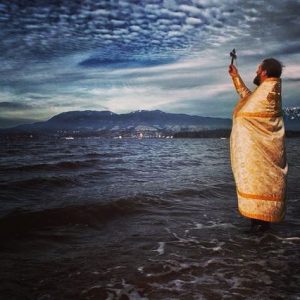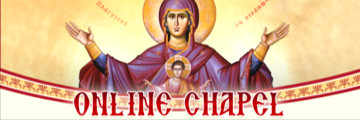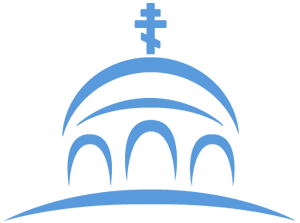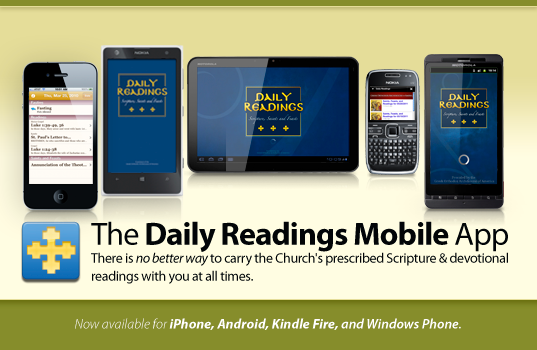 Approaching the Theophany of the Lord, we are again before the intersection of time and eternity. In the Apolytikion for Epiphany we sing “At your baptism in the Jordan O Lord, the Worship of the Trinity was made manifest…”
Approaching the Theophany of the Lord, we are again before the intersection of time and eternity. In the Apolytikion for Epiphany we sing “At your baptism in the Jordan O Lord, the Worship of the Trinity was made manifest…”
There is a story from II Kings, chapter 6 in which the prophet Elisha invites some people to go to the Jordan river and build new homes because where they had been living had “grown to small” for them. Wisely, the men ask Elisha to accompany them and he agrees.
As one of them was cutting down a tree to build a new home the axe head flew off the handle [Ever heard that expression before?] and into the Jordan river sinking to the bottom. The man cried out, “Oh no! It was borrowed.” He was immediatley aware that he was a debtor to the owner of the axe and would have to repay.
The prophet asks him, “Where did it fall?” It is important to know where a debt is incurred. Elisha went to that spot and cut a new piece of wood and threw it into the Jordan river at just that spot. The axe head floated up and Elisha told the man, “Pick it up” and he did. His debt was now paid. Of course we are not just talking about sticks and axe heads…
The Jordan river is what originally separated Israel from the Promised Land. Historically in time and space it must be ‘crossed’ in order for the Israelites to enter into the Promised Land. With the Lord’s baptism, the Jordan river is revealed as the boundary each of us must cross over which separates our mortal bodies in time from the promise of eternal life.
Like the borrowed axe head that Elisha recovered from the Jordan river by throwing a new living piece of wood into the water, our being, is on borrowed time, or as St. Maximos the Confessor writes, “our very being is on loan” to us. So when we “fly off the handle” or otherwise squander our potential, making little of the lives God gives us, we aquire debts that must be repaid. It is Christ who repays them for us out of love, by plunging himself into death on the wood of the Cross, redeeming for us what we cannot do for ourselves.
In baptism we enter freely into the death of Christ in historical time in the hope of emerging into the gift of Eternal life as a member Christ’s Risen and Ascended Body, the Church. We assent to a death which we cannot in truth avoid, just as Christ assented to his own death, even though he could have refused. He freely submitted to baptism by an ordinary mortal in ordinary water in historical time and space, even though he was God who cannot be contained in time and space and needed no baptism. He was baptized for our sakes which gives great meaning to the prayer “Forgive us our debts as we forgive our debtors.” We learn to love others by having been loved first by Christ.
The Incarnation and birth of Christ was itself a ‘baptism’ into that which otherwise could not contain Him. By entering his human mother’s womb, as the Church chants, “it became more spacious than the heavens.” Nor could creation be illumined by Divine Grace apart from the willingness of the Logos to be united with the created order; to be “fully uncreated” and “fully created” simultaneously without confusion or division, in His Person. As St. Athanasius points out, Christ’s Incarnation was greater than His human birth in historical time. His Incarnation was a second creation, giving to humanity the possibility of Holy Communion with God, being born of the new Eve, His Church, and renewing all creation.
The baptism in the water of the Jordan river by John the Baptist of The One who baptizes with the fire of the Holy Spirit, reveals to us that what we do in historical time is transformed and brought to completion from Above in ways we do not realize. Not everyone present heard the Voice of the Father say “This is my beloved Son with whom I am well-pleased.” Not everyone saw the Holy Spirit in the form of a dove descend and remain upon Jesus. John the Baptist, as the Forerunner of Christ, witnessed this [Jn 1:32] and gave testimony for us.
This same intermingling of time and Eternity in Christ occurs in every aspect of the Divine Liturgy which we celebrate. What we carry out in time is confirmed in eternity. This is a condescension of love for us which Christ confirms through the Holy Spirit. We may not experience that the angels worship and glorify God in our midst surrounded by the Saints, but they do, and from time to time there are witnesses of this, enough for us to know what we do has significance far beyond what we are able to realize. Part of the reason for this is how estranged we are even from the reality of our oneness with creation itself, let alone the invisible spiritual world. Theophany helps open our eyes to the invisible link between everything.
When the Onondaga Nation’s chief, Oren Lyons, spoke to United Nations in 1977, he said “I do not see a delegation for the four footed. I see no seat for the eagles.” Oren had been the first among his people to attend college. He describes how on a visit home during a semester break, his uncle had taken him fishing. When they were out on the lake he said to him, “You have been to college now so you must be pretty smart. Let me ask you, who are you?
“What do you mean uncle? I’m your nephew!”
His uncle asked again, “Who are you?”
“I’m Oren Lyons.”
“No!”
“I am an Onondaga.”
“No!”
“I’m a human being.”
“No!”
After he had run out of responses and begun to experience that humility of consciousness beneath the presumption of easy mechanical answers, a state in which he “did not know,” and was receptive in love to his elder, his uncle pointed to the shoreline and asked him,
“Do you see that bluff over there. You are that bluff. And that giant pine on the other shore? You are that pine! And the water that supports this boat? You are this water.[1]
In this personal way, as an elder and keeper of his people’s Traditional ways, Oren’s uncle helped his nephew see beyond the naive and presumpuous ‘civilized’ individualism that was blind to the unity of life which his people had known for millennia. He brought him back to the essential relations we have with all life. It is possible to have both a modern education and not lose our connection to the Earth and to God, but we must be vigilant and seek this unity which is found through the fullness of our relationship with Christ who is one with all Creation.
A hieromonk friend told me that when some Native Americans in his area witnessed an Orthodox Theophany service and saw the cross thrown into the water… they understood its meaning as purifying the whole earth and they expressed a new appreciation for Christianity.
Romanian religious anthropologist, philosopher and historian Mircea Eliade maintained that so called “primitive” people are in this way more spiritually advanced than their civilized counterparts who have lost awareness of our relationship with the earth and its creatures, reflecting a one-sided captivity to a man-made worldview that fosters a collective individualism which does not realize all the earth and its creatures are part of one life together. We are the body of earth and Christ’s Incarnation and Baptism are testimony of His unity with this life. In Him we are invited to cross the Jordan river at the crossroad between time and Eternity
Through the cross joy has come to all the world. Not just to people. In the Body of Christ, each person recapitulates all creation as Christ does. We are incorporated into His Body and become response-able not only for one another but for every aspect of creation; the four-legged beings, the eagles and the biosphere. Creation in all its uniqueness expresses the Divine love and creativity which manifests a multitude of spiritual essences in physical form, like the colors refracted in the rainbow which all a part of one light.
At Theophany the Trinity is made manifest as having a relationship with all the earth in Christ. This relationship is entered into through the Cross. The Baptism of Christ is our baptism and our assent to dying to the selfishness and self-preoccupation that traps us and blinds us to this relationship. We enter a new world, a Trinitarian world with all that this means for the creatures, rivers, oceans, stars and space. Theophany is the freeing of our life to reunite with all life in and through Christ whose incarnation we have just celebrated.
The implications of living in a more awakened way to this in our lives we can see in an event from the life of St. Sophrony which continues to inspire and reorient me. Once when he was walking with his spiritual father, St Silouan in the forest of Mt. Athos Fr. Sophrony pulled a single tiny leaf off a tree…” Silouan responded quietly.
“Your heart is not right.”
Imagine that! How sensitive, direct and powerful this encounter would have been for him. Think of what it reveals to us of how far we are from being truly ‘civilized,’ truly mature in Christ.
Once at a pastoral psychotherapy conference I had been asked to give the theological response to the plenary speaker. Afterward, I hiked alone up a small mountain, to a favorite place where I could be still, sitting on a rock outcropping overlooking a series of small mountains cascading in the distance.
On the way up, I had joy and a sense of presence to everything around me so much that I was aware of not feeling worthy to even step on the earth. It was a kind of doxology, a joyful tender response to a palpable sense of God’s invisible presence. I sat in silence for a long time and prayer was from the place where you are thirsty to drink in the silence and you don’t want to stop. Everything around you is precious, brought into greater significance as it somehow mediates this silence and invisible life beyond it which also has the same effect on noticing your own life as a part of it all.
After a time, I stopped and got up. Now instead of “being prayer” I had “ended praying.” On the way down, I was enjoying the physical sensations of scrambling along the path as I like to do when I am running down mountains, relishing feeling physically strong and remembering being able to do this when I was a teenager. Then suddenly I gasped as in my reveling, I recklessly pulled a leaf off a tree.
Something in me woke up and looked to see where my attention had been at just that moment in contrast to what I had been experiencing before. Along with having shifted into the pleasure of my body and the reveries of youthful vitality, I realized my attention had at that moment been captured by a daydream in which I was vaingloriously imagining whether the speaker in the second half of the plenary session would comment on my inspired response!
This was a valuable glimpse into my personal inconsistency and the power of individualistic narcissism which robs the earth of having any value in and of itself. I took from it and offered it to myself mindlessly from a state of consciousness in which I could do whatever I liked to the trees without a thought of their relationship to the greater whole. This is sin. Immaturity. Poor attention. Delusion. Monologue instead of dialogue. And we do this to one another all the time and do not realize it.
As we prepare to celebrate Theophany, “let us attend” to how precious all creation is, and each of us along with it, as an integral part of the Body of the earth, which God “loves so much that He gave His only Son” so that even though he knows we will at times do to Him what we do to the earth, yet He endures this even unto death, and so brings about the possibility that we may learn to love the world as He loves us. In so doing, let us seek to glorify God in the smallest of ways, as St. Silouan tried to teach St. Sophrony.
For as Jesus told his disciples, God is aware of every hair of our head which is numbered, and every sparrow that falls from a tree. [Mt 10:29-30] And anyone who gives even a drink of water to someone else out of care for that person as having the value of a potential disciple of Christ, will not lose their reward. [Mt 10:42]
Footnotes
[1] (cf Huston Smith, Tales of Wonder. HarperOne, 2009. Pp. 159-160)



